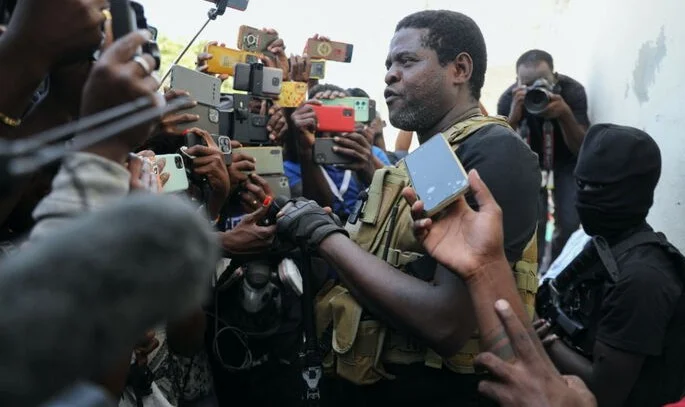
Haitian gang leader Jimmy Chérizier, known as Barbecue, addressing the media. Photo | Courtesy.
In Summary:
- Haiti’s notorious gang leader, Jimmy Chérizier, alias Barbecue, predicts tough resistance against Kenyan police officers as they prepare for their peacekeeping mission in Haiti.
- Barbecue accuses the US government of fueling conflict in Haiti and dismisses the effectiveness of the presidential transitional council in restoring peace, claiming it serves foreign interests.
Jimmy Chérizier, famously known as Barbecue, the leader of a notorious gang in Haiti, has voiced his confidence in thwarting the efforts of Kenyan police officers slated for deployment in their peacekeeping mission to Haiti.
In an interview with National Public Radio (NPR) based in the United States on May 13, Barbecue issued a stern warning to the Kenyan police, anticipating formidable resistance once the multinational peacekeeping mission commences.
Barbecue portrayed a sense of determination, predicting a prolonged battle where international forces would eventually tire and retreat without achieving peace.
He attributed his resilience to divine protection, stating, “If the Haitian revolutionary Jean-Jacques Dessalines worried about his life, Haiti wouldn’t be free today.”
Accusing the United States government of inciting conflict in Haiti, Barbecue asserted that even his demise in the anticipated battles would not guarantee Haiti’s freedom.
Expressing skepticism about the effectiveness of the presidential transitional council in restoring peace, Barbecue labeled it as a tool of foreign influence rather than a representation of the will of the Haitian people.
“The transitional council is not the will of the Haitian people. This is what Washington wants and this is what they have imposed,” he contended.
Barbecue further argued that the gangs were combating the affluent class, whom he held responsible for Haiti’s current turmoil.
These statements by the gang leader follow the initiation of preparations by the US military to accommodate the impending arrival of Kenyan police forces.
Sources familiar with the mission hinted at a potential deployment before the end of May, coinciding with President William Ruto’s scheduled State visit to the US.
Aside from Kenya, six other nations have pledged their support to the mission by contributing their forces to help quell the violence in Haiti.
These nations include Jamaica, Chile, Grenada, Paraguay, Burundi, Chad, Nigeria, and Mauritius.
The gangs in Haiti have been implicated in numerous atrocities, including killings and sexual assaults.
According to a United Nations report, there were 4,451 killings recorded last year and 1,554 by March this year, attributed to the ongoing violence orchestrated by these gangs.
